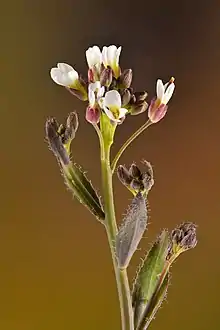Arabis hirsuta
Arabis hirsuta, known as hairy rock-cress,[4] is a flowering plant of the genus Arabis in the family Brassicaceae. In previous North American works, this species has been broadly defined to include plants native to Europe, Asia, and the northern half of North America,[5] but is now more often restricted to a narrower subgroup restricted to Europe.[6][7][8]
| Arabis hirsuta | |
|---|---|
 | |
| Scientific classification | |
| Kingdom: | Plantae |
| Clade: | Tracheophytes |
| Clade: | Angiosperms |
| Clade: | Eudicots |
| Clade: | Rosids |
| Order: | Brassicales |
| Family: | Brassicaceae |
| Genus: | Arabis |
| Species: | A. hirsuta |
| Binomial name | |
| Arabis hirsuta | |
| Synonyms[2][3] | |
|
Synonymy
| |
This erect, 15–60 cm (6-18 inches) high hairy plant is usually unbranched, with a long spike of flowers. Lower leaves form a rosette, the stalkless upper-leaves clasp the stem. The white petals are twice as long as the sepals, flowers June–August. The fruits are cylindrical and pressed close to the stem and the slightly winged seeds are reddish brown. The hairs are stiff and forking. The species grows on chalk slopes, dunes, hedgebanks, walls and rocks.[9]
Conservation status in the UK is near threatened as of 2001.[10]
Gallery

_5731.JPG.webp)


 1796 illustration [11]
1796 illustration [11]
See also
References
- Tropicos, Arabis hirsuta
- The Plant List, Arabis hirsuta (L.) Scop.
- Tropicos, Turritis hirsuta L.
- BSBI List 2007 (xls). Botanical Society of Britain and Ireland. Archived from the original (xls) on 2015-06-26. Retrieved 2014-10-17.
- Reed Clark Rollins. The Cruciferae of Continental North America. Stanford University Press. 1993.
- Flora of North America, Arabis Linnaeus, 1753; Rockcress
- J.. ZR. Aleroyd. Arabis. in Tutin et al. Flora Europaea. vol. 1. 2nd ed. 1993.
- Robert Karl, Marcus A. Koch. Phylogenetic signatures of adaptation: The Arabis hirsuta species aggregate (Brassicaceae) revisited. Perspectives in Plant Ecology, Evolution and Systematics. in press. Available online 24 June 2014
- Reader's Digest Nature Lover's Library, Field Guide to the Wildflowers of Britain, Editor Michael W. Davison, Art Editor Neal V. Martin, The Reader's Digest Association Limited, 11 Westferry Circus, Canary Wharf, London E144HE, Reprint 2001, ISBN 0 276 42506 5.
- NBN Atlas, Arabis Hirsuta
- 1796 illustration, Figure 15 from Deutschlands Flora in Abbildungen. Author Johann Georg Sturm. Painter: Jacob Sturm.
External links
- photo of herbarium specimen at Missouri Botanical Garden
- Jepson Manual Treatment, University of California
- United States Department of Agriculture Plants Profile
- "Arabis hirsuta". Germplasm Resources Information Network. Agricultural Research Service, United States Department of Agriculture.
- Calphotos Photo gallery, University of California
- NBN Atlas, Arabis Hirsuta